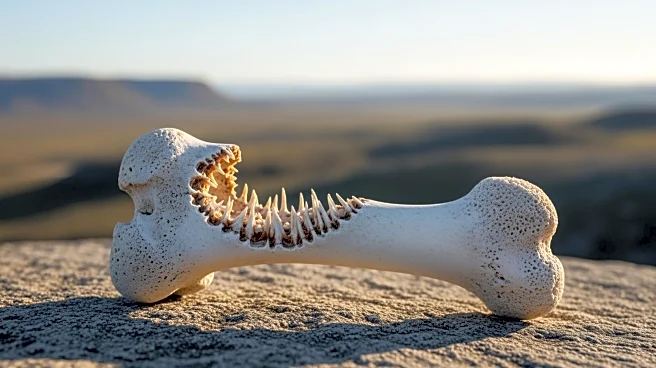What's Happening?
A recent study published in the Journal of Human Evolution explores the significance of scavenging in human evolution. Led by Ana Mateos and Jesús Rodríguez from the Centro Nacional de Investigación sobre la Evolución Humana (CENIEH), the research challenges
traditional views on scavenging as a marginal activity. The study suggests that scavenging provided a reliable food source during times of scarcity, contrary to the belief that it was unpredictable and risky due to pathogen transmission. The research highlights anatomical, physiological, and behavioral adaptations that made early humans efficient scavengers, such as the acidic pH of the human stomach and the use of fire to cook, reducing infection risks. The study also notes that scavenging complemented hunting and gathering, providing a crucial survival strategy.
Why It's Important?
The study's findings have significant implications for understanding human evolution and survival strategies. By emphasizing scavenging as a reliable food source, the research challenges the notion that early humans quickly abandoned scavenging for hunting. This perspective reshapes the understanding of human dietary evolution, suggesting that scavenging played a fundamental role alongside hunting and gathering. The study also highlights the ecological importance of carrion in ecosystems, where it supports diverse scavenger species. Recognizing scavenging as a vital survival strategy may influence current views on human adaptability and resilience, offering insights into how early humans thrived in challenging environments.
What's Next?
The study opens avenues for further research into the role of scavenging in human evolution. Future studies may explore the specific adaptations that enabled early humans to efficiently locate and consume carrion. Additionally, researchers might investigate the cultural and social aspects of scavenging, such as communication and cooperation in locating food sources. The findings could also prompt a reevaluation of archaeological evidence, considering scavenging as a complementary activity to hunting. As the study challenges traditional views, it may influence ongoing debates in paleoanthropology and ecology regarding human dietary practices and survival strategies.
Beyond the Headlines
The study's implications extend beyond human evolution, offering insights into the ethical and cultural dimensions of food consumption. By recognizing scavenging as a legitimate survival strategy, the research challenges perceptions of scavenging as a primitive or inferior activity. This perspective may influence contemporary discussions on sustainable food practices and resource utilization. Additionally, the study highlights the interconnectedness of species within ecosystems, emphasizing the role of carrion in supporting biodiversity. Understanding these dynamics could inform conservation efforts and ecological management strategies, promoting a holistic view of ecosystem health.

















